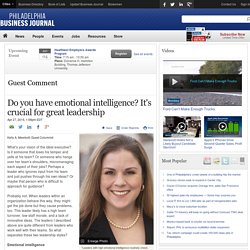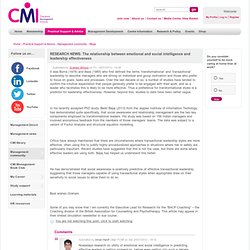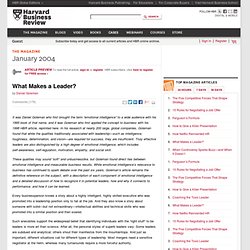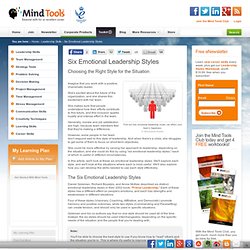

Success Depends on Your Personality More Than IQ. Amateur to Professional through Application of Insight. The 5 Ways to Spot an Emotionally Intelligent Leader. Research has shown us that more than 90 percent of top leadership performers have a high amount of emotional intelligence, or EI.

The higher up the ladder that leaders are, the more people they impact and their EI becomes increasingly important. The person at the top sets the atmosphere that permeates the organization, including the emotional temperature. Not only does a leader with low emotional intelligence have a negative impact on employee morale, it directly impacts staff retention. We know that the biggest reason that people give for leaving an organization is the relationship with those above them. Here are five ways to spot an emotionally intelligent leader: 1. Importance of Emotional Intelligence in Leaders. Do you have emotional intelligence? It's crucial for great leadership - Phila... "Leaders with high emotional intelligence routinely check their behavior," writes Philadelphia leadership coach Kelly A.

Meerbott. RESEARCH NEWS: The relationship between emotional and social intelligence and leadership effectiveness. It was Burns (1978) and Bass (1985) who first defined the terms ‘transformational’ and ‘transactional’ leadership to describe managers who are strong on individual and group motivation and those who prefer to focus on goals, tasks and processes.

Over the last decade or so, a number of studies have tended to confirm the intuitive expectation that people generally prefer to be engaged with their work, and so a leader who facilitates this is likely to be more effective. Thus a preference for transformational styles is a predictor for leadership effectiveness. However, beyond this, studies to date have been rather vague.
In his recently accepted PhD study, Badri Bajaj (2013) from the Jaypee Institute of Information Techology, has demonstrated quite specifically, that social awareness and relationship management are the two key components employed by transformational leaders. Social Intelligence Competencies Predict Transformational Leadership Style and Effectiveness. It pays to have an eye for emotions. Attending to and caring about the emotions of employees and colleagues -- that's for wimps, not for tough businesspeople and efficient performers, right?

Wrong! An extensive international study has now shown: The "ability to recognize emotions" affects income. The corresponding author of the study is Professor Dr. Gerhard Blickle of the Department of Psychology at the University of Bonn. The results are published in the Journal of Organizational Behavior. "Although managing employees and dealing with people often involves reading their emotions and determining their moods, not everyone is good at it," Blickle says. Once the emotion recognition task was completed, the researchers asked the participants' colleagues and supervisors to assess the political skills of the participants (for example, whether participants socially well attuned, influential, apparently sincere, and good as networkers). Can the ability to recognize feelings be increased? The Emotion Which Drives People To Work The Hardest.
People prone to this emotion work the hardest.

People prone to feeling guilty are amongst the hardest workers, a new study finds. Not only that but people prone to feeling guilty are also highly ethical and are less likely to take advantage of other people’s skills to get paid more. The results come from research published in the Journal of Personality and Social Psychology, in which psychologists carried out 5 studies to test the effects of feeling guilty on work performance (Wiltermuth & Cohen, 2014). Dr. Scott S. What Makes a Leader? It was Daniel Goleman who first brought the term “emotional intelligence” to a wide audience with his 1995 book of that name, and it was Goleman who first applied the concept to business with his 1998 HBR article, reprinted here.

In his research at nearly 200 large, global companies, Goleman found that while the qualities traditionally associated with leadership—such as intelligence, toughness, determination, and vision—are required for success, they are insufficient. Truly effective leaders are also distinguished by a high degree of emotional intelligence, which includes self-awareness, self-regulation, motivation, empathy, and social skill. These qualities may sound “soft” and unbusinesslike, but Goleman found direct ties between emotional intelligence and measurable business results. Every businessperson knows a story about a highly intelligent, highly skilled executive who was promoted into a leadership position only to fail at the job. Evaluating Emotional Intelligence. What Makes a Leader? Every businessperson knows a story about a highly intelligent, highly skilled executive who was promoted into a leadership position only to fail at the job.

And they also know a story about someone with solid—but not extraordinary—intellectual abilities and technical skills who was promoted into a similar position and then soared. Such anecdotes support the widespread belief that identifying individuals with the “right stuff” to be leaders is more art than science. After all, the personal styles of superb leaders vary: Some leaders are subdued and analytical; others shout their manifestos from the mountaintops. L.E.A.D with Emotional Intelligence. Six Emotional Leadership Styles - Leadership Training From MindTools.
Choosing the Right Style for the Situation Find out how emotional leadership styles can affect your team's happiness. © iStockphoto/Kuklev Imagine that you work with a positive, charismatic leader.

She's excited about the future of the organization, and she shares this excitement with her team. She makes sure that people understand how their efforts contribute to this future, and this inclusion sparks loyalty and intense effort in the team. Generally, morale and job satisfaction are high, because team members feel that they're making a difference. However, some people in her team don't respond well to this style of leadership. Getting Free Of Self-Importance Is The Key To Happiness. When Power Goes To Your Head, It May Shut Out Your Heart. Neuroscientists have found evidence to suggest feeling powerful dampens a part of our brain that helps with empathy.

Vladgrin/istockphoto.com hide caption toggle caption Vladgrin/istockphoto.com Neuroscientists have found evidence to suggest feeling powerful dampens a part of our brain that helps with empathy. Six Principles for Developing Humility as a Leader - John Dame and Jeffrey Gedmin. Whether we’re looking at business or politics, sports or entertainment, it’s clear we live in an era of self-celebration. Fame is equated with success, and being self-referential has become the norm.
As a result we are encouraged to pump ourselves full of alarming self-confidence. The Signs of a Leader's Empathy Deficit Disorder.